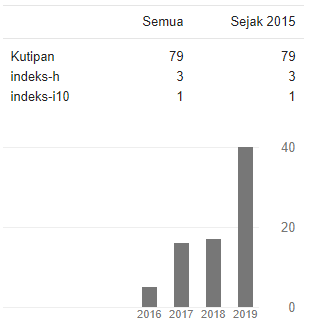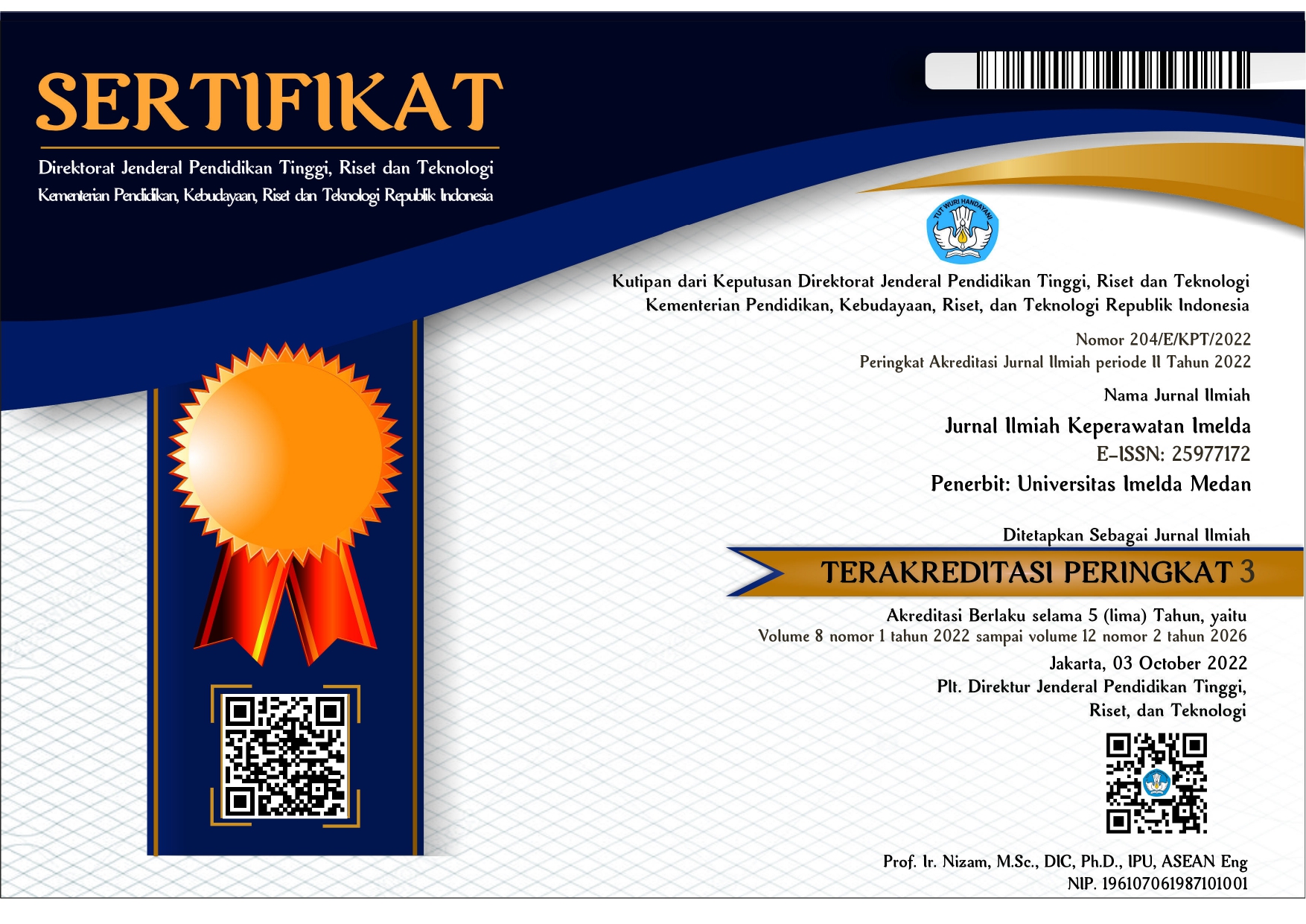HUBUNGAN PENGETAHUAN DAN EFIKASI DIRI PASIEN PENYAKIT GINJAL KRONIK YANG MENJALANI HEMODIALISIS
DOI:
https://doi.org/10.52943/jikeperawatan.v9i2.1224Kata Kunci:
Hemodialisis, Pengetahuan, Efikasi DiriAbstrak
Latar belakang: Pengetahuan yang baik akan membantu pasien penyakit ginjal kronik yang menjalani hemodialisis memiliki efikasi diri yang baik dalam mengatasi gejala dan keluhan yang dialami untuk meningkatkan kualitas hidupnya. Penelitian ini bertujuan untuk mengetahui pengetahuan dan efikasi diri pasien penyakit ginjal kronik yang menjalani hemodialisis serta hubungannya. Metode: Penelitian ini merupakan penelitian deskriptif korelasional dengan 131 pasien penyakit ginjal kronik yang menjalani hemodialisis di Kota Padang menjadi responden penelitian. Penelitian dilakukan di dua unit hemodialisis yang ada di Kota Padang yaitu Rumah Sakit. M. Jamil Padang dan RS Tk III Reksodiwiryo. Teknik pengambilan sampel adalah purposive sampling dengan memperhatikan kriteria inklusi yaitu menjalani hemodialisis secara rutin minimal tiga bulan; pasien dewasa berusia 18-65 tahun; mampu membaca dan menulis bahasa Indonesia; dan bersedia untuk berpartisipasi. Penelitian dilakukan pada bulan April 2022. Uji korelasi Spearman digunakan untuk melihat hubungan pengetahuan dengan efikasi diri pasien penyakit ginjal kronik yang menjalani hemodialisis. Hasil: Hasil penelitian menunjukkan bahwa nilai rata-rata pengetahuan pasien yang menjalani hemodialisis adalah 17,94 (2.968) (rentang 0-25), dan nilai rata-rata efikasi diri adalah 43,57 (9,89) (rentang 6-60). Hasil uji korelasi menunjukkan adanya hubungan positif yang signifikan antara pendidikan dengan efikasi diri dengan p-value <0,0001. Kesimpulan: Diharapkan tenaga kesehatan memiliki program edukasi yang terstruktur untuk meningkatkan pengetahuan pasien penyakit ginjal kronik yang menjalani hemodialisa sehingga pasien dapat meningkatkan self efficacy dalam mengatasi gejala yang dirasakannya.
Unduhan
Referensi
Bandura, A. (1997). Self Efficacy – The Exercise of Control (Fifth Printing, 2002). W.H. Freeman & Company.
Campbell, S. ,& D. M. (2010). Health literacy in chronic kidney disease education. Renal Society of Australasia Journal, 6(1).
Chen, S.-H. , T. Y.-F. , S. C.-Y. , W. I. W. , L. C.-C. , & W. M.-S. (2011). The impact of self-management support on the progression of chronic kidney disease-a prospective randomized controlled trial. Nephrology Dialysis Transplantation, 26(11), 3560–3566.
Couser, W. G., Remuzzi, G., Mendis, S., & Tonelli, M. (2011). The contribution of chronic kidney disease to the global burden of major noncommunicable diseases. Kidney International, 80(12), 1258–1270. https://doi.org/10.1038/ki.2011.368
Curtin, R. B., Sitter, D. C. B., Schatell, D., & Chewning, B. A. (2004). Self-management, knowledge, and functioning and well-being of patients on hemodialysis. Nephrology Nursing Journal : Journal of the American Nephrology Nurses’ Association, 31(4).
Devraj, R., Borrego, M. E., Vilay, A. M., Pailden, J., & Horowitz, B. (2018). Awareness, self-management behaviors, health literacy and kidney function relationships in specialty practice. World Journal of Nephrology, 7(1), 41–50. https://doi.org/10.5527/wjn.v7.i1.41
Enworom, C. D. , T. M. (2015). Evaluation of Kidney Disease Education on Clinical Outcomes and Knowledge of Self-Management Behaviors of Patients with Chronic Kidney Disease. In Nephrology Nursing Journal (Vol. 42, Issue 4). https://www.researchgate.net/publication/283904243
Indonesian Renal Registry. (2018). 11th Report of Indonesian renal registry 2018. In Retrieved from https://www.indonesianrenalregistry.org/data/IRR 2018.pdf.
Jager, K. J., & Fraser, S. D. S. (2017). The ascending rank of chronic kidney disease in the global burden of disease study. In Nephrology Dialysis Transplantation (Vol. 32, pp. ii121–ii128). Oxford University Press. https://doi.org/10.1093/ndt/gfw330
Johnson, M. L. , Z. L. , W. J. L. , H. M. , P. B. , & P. T. (2016). Patient activation with knowledge, self‐management and confidence in chronic kidney disease. Journal of Renal Care. Journal of Renal Care, 42(1), 15–22.
Leng Chow, W., Joshi, V. D., Soe Tin, A., van der Erf, S., Fung Yen Lim, J., Sin Swah, T., Swee Hong Teo, S., Soo Chye Goh, P., Choon Seng Tan, G., Lim, C., & Yi-shern Kee, T. (2012). Limited knowledge of chronic kidney disease among primary care patients-a cross-sectional survey. http://www.biomedcentral.com/1471-2369/13/54
Levey, A. S., Schwartz, W. B., & Coresh, J. (2012). Chronic kidney disease. Lancet, 379, 165–180. https://doi.org/10.1016/S0140
Levin, A., Tonelli, M., Bonventre, J., Kasiske, B., Kretzler, M., Levey, A. S., Moe, O., Agarwal, S. K., &Alrukhaimi, M. (n.d.). Lancet Commission Global Kidney Health 2017 and beyond: A roadmap for closing gaps in care, research, and policy.
Mailani, F., Muthia, R., Herien, Y., Huriani, E., Chan, C. M., & Abdullah, K. L. (2021). ORIGINAL RESEARCH The Fluid Management Experience in Patients with Chronic Kidney Disease Undergoing Hemodialysis in Indonesia: A Qualitative Study. Nurse Media Journal of Nursing, 11(3), 389–403. https://doi.org/10.14710/nmjn.v11i3.38838
Oktarina, Y. , S. A. (2019). “The efikasi diri in Hemodialysis Patients. 2nd Sriwijaya International Conference of Public Health (SICPH 2019), 25, 430–433.
Ong, S. W., Jassal, S. V., Porter, E., Logan, A. G., & Miller, J. A. (2013). Using an electronic self-management tool to support patients with chronic kidney disease (CKD): A CKD clinic self-care model. Seminars in Dialysis, 26(2), 195–202. https://doi.org/10.1111/sdi.12054
Thomas, N. (Ed. ). (2019). Renal Nursing: Care and Management of People with Kidney Disease. john Wiley & Sons.
Wright, J. A., Wallston, K. A., Elasy, T. A., Ikizler, T. A., & Cavanaugh, K. L. (2011). Development and results of a kidney disease knowledge survey given to patients with CKD. American Journal of Kidney Diseases, 57(3), 387–395. https://doi.org/10.1053/j.ajkd.2010.09.018









